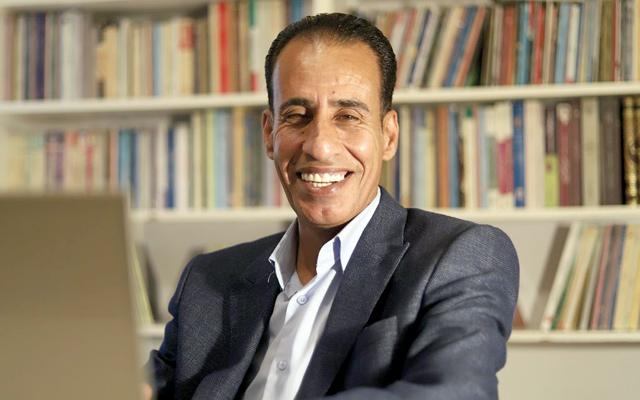- Local News
- Thu-2021-05-27 | 01:57 pm

Jordanian author Jalal Barjas won the 14th edition of the prestigious International Prize for Arabic Fiction (IPAF) on Tuesday for his novel "Notebooks of the Bookseller”.
In an interview with The Jordan Times, Barjas said: "This win is not for Barjas only, but for the Jordanian novel and its influence on Arab culture and Arabic literature.”
In addition to receiving $50,000, additional funds will be provided to translate his work to English.
"The Jordanian novel has never won the Booker price before; this achievement means that the Jordanian novel will not only reach a wider audience worldwide but will also enjoy international recognition,” Barjas said.
Published by the Arabic Institute for Research and Publishing, "Notebooks of the Bookseller” recounts a book lover’s experience with Schizophrenia and crimes he commits under the identity of fictional characters. While mental illnesses are not commonly discussed in Jordanian novels or in Arabic literature in general, the novel emphasises its "humane trait”.
"While the novel takes place in Amman, it expands to the Arabic conscious as a whole,” said Barjas in the interview.
"The novel can be read in all Arab countries and by all readers easily because the dominating trait is very humane. This trait makes it an easy read not only to Arabs but to international readers as well,” he said.
With the main character in the novel, Ibrahim, suffering from Schizophrenia, Barjas emphasises the close attention he gives to his characters’ psychological traits in his literary works.
"I observe the characters in my novels depending hugely on my deep studies in psychology. This opens a pathway for the reader to understand the character better and reflect on his inner self,” commented Barjas.
As the schizophrenic atmosphere of the novel opens up a narrative of conflict between good and evil, Barjas comments on choosing the polyphonic narrative technique as the style of writing in "Notebooks of the Bookseller”.
"This technique has allowed me to introduce different voices through the novel,” Barjas said.
"In each of their notebooks, we hear the voices of Ibrahim, Leila, Yousef and multiple characters in the novel,” he said.
According to Barjas, this polyphonic technique in narration gives multiple characters access to their "freedom of speech” rather than falling under the dictating power of the omniscient narrator himself.
During a virtual ceremony, Chawki Bazih, Chair of the 2020 IPAF Judging Panel said: "The author presents us with the darkest portraits of homelessness and poverty, where meaning has been lost and hope torn up by the roots, turning life into a realm of nightmares. Despite this, the novel does not call for despair. Rather, through it, the author is saying that reaching the depths of pain is a necessary condition for finding new dreams and standing up once more with hope on firmer ground.”
Born in 1970, Barjas has published two poetry collections as well as novels and short stories that have won several awards such as Rukus ibn Zaʼid Uzayzi Prize in 2012, Rifqa Doudin Prize for Narrative Creativity in 2014 and Katara Prize for the Arabic Novel in 2015. Barjas was IPAF-longlisted in 2019 before being shortlisted and winning the prize this year.
According to IPAF’s website, The International Prize for Arabic Fiction is an annual literary prize for novels in Arabic. It is currently sponsored by the Abu Dhabi Arabic Language Centre, at the Department of Culture and Tourism — Abu Dhabi, and has been mentored by the Booker Prize Foundation in London.









